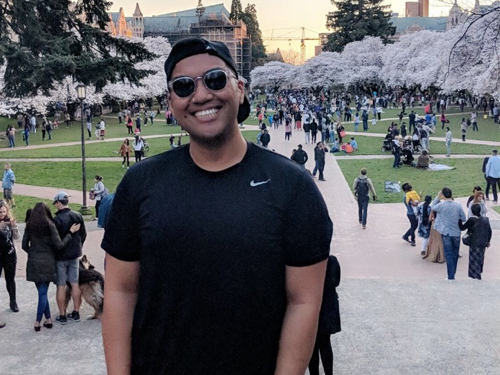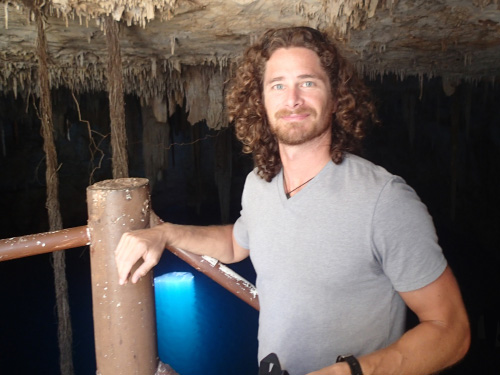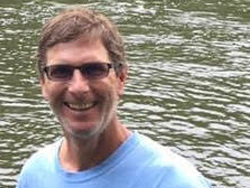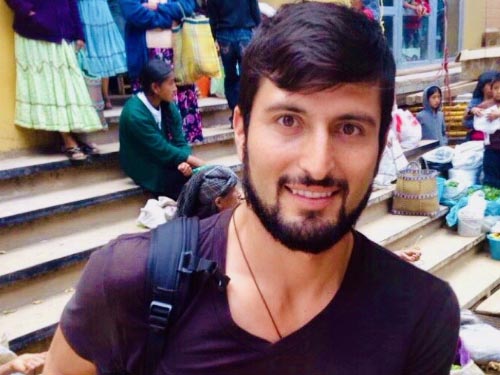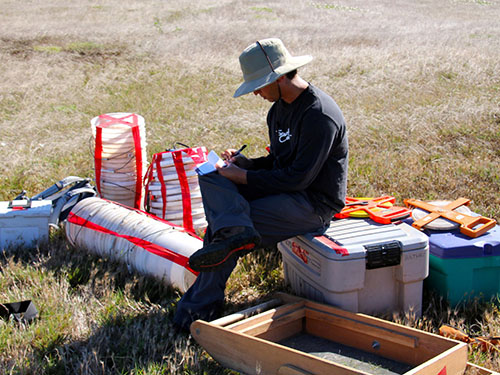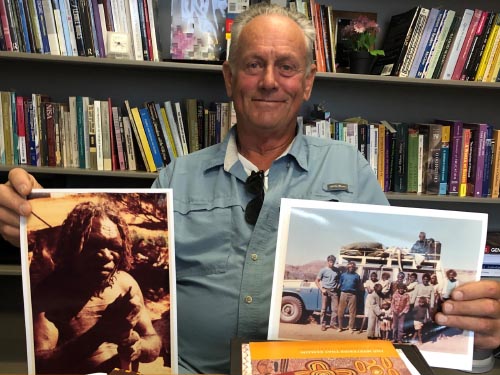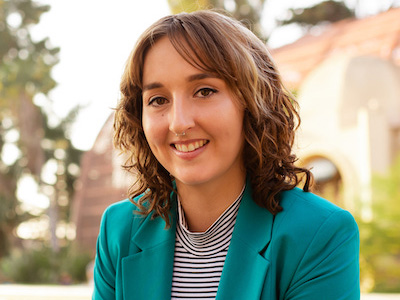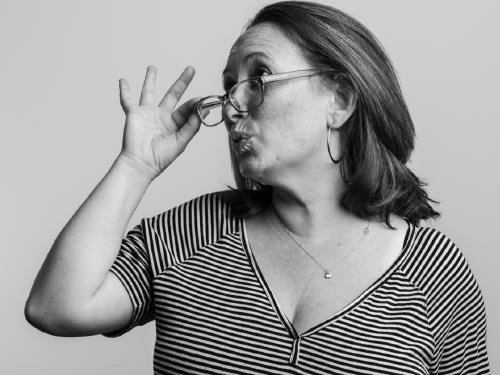
Alumni Stories
Find out the latest from our alumni.

Douglas La Rose
Douglas La Rose completed our M.A. program in 2011 and has forged a rewarding career as international development and humanitarian aid project development specialist. In his master's thesis research he explored agricultural responses to environmental change in the forest-savannah transition zone of eastern Ghana. He looked at the ways farming communities understand and respond to environmental change, examining the interplay between different types of knowledge: Indigenous, global (knowledge promoted by organizations such as the UN), and hybrid. He has moved between project management and project design roles, bringing experience from programming, coordination, and stakeholder engagement across dozens of countries in Africa (Benin, Burkina Faso, Ghana, Ethiopia, Kenya, Madagascar, Malawi, Mali, Mozambique, Niger, South Sudan, Sudan, Togo, and Zimbabwe) and Latin America (El Salvador, Guatemala, and Honduras) to the design of people-centered projects that are inclusively designed for sustainable impacts.
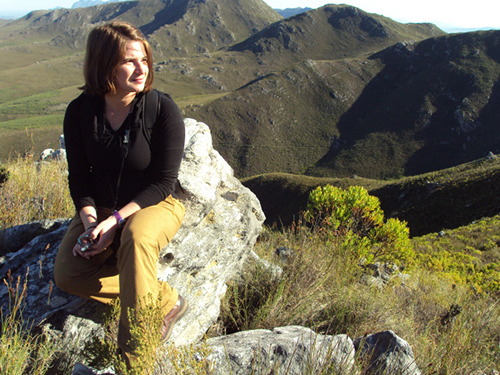
Amanda L. Ellwanger
Amanda Ellwanger is currently a Lecturer of Anthropology at Georgia State University, Perimeter College where she teaches a variety of introductory courses. Her research uses an ethnoprimatological perspective to integrate the behavioral ecology of non-human primates with the sociocultural dimensions of wildlife. As an M.A. student at SDSU, she worked with Dr. Erin P. Riley. For her M.A. research, Dr. Ellwanger used ethnographic interviews and geospatial analysis to examine overlapping resource use between people and the Guizhou snub nosed monkey (Rhinopithecus brelichi) in Fanjingshan National Nature Reserve, China. After completing her M.A. degree, she began working on a doctoral degree at University of Texas at San Antonio. Her research, which was funded by the National Science Foundation, examined how human activity and attitudes shape foraging and sociality in chacma baboons (Papio ursinus) in Western Cape, South Africa. She successfully completed her Ph.D. in the spring of 2020. Dr. Ellwanger’s research approach uses an integrative methodological toolkit including animal ethology, ethnography, ecological sampling, and geospatial analysis to examine the intersection of evolutionary, ecological, and cultural relationships between people, animals, and their environments. In addition to exploring theoretical aspects of human-animal relationships, she is interested in using her research to mitigate conflict and promote coexistence between people and wildlife. Anthropologists can play a critical role by working with local communities to gain an embedded understanding of how the local context is shaped by broader social, historical, ecological, political, and economic factors, and then that knowledge can be used to facilitate locally relevant, community driven solutions to problems.
MarkJason Cabudol
MarkJason Cabudol received training in qualitative research as a research assistant under the guidance of Dr. Elisa (EJ) Sobo in the Department of Anthropology and Dr. Tracy L. Finlayson in the School of Public Health on their respective studies throughout his senior year at SDSU. He prepared, presented, and won research awards per study towards the end of his senior year. He earned his BA in sociocultural anthropology in 2016 and continued working with diverse public health professionals and scholars at the University of California Los Angeles’s School of Dentistry. MarkJason continued to excel in research by delivering collaborative research findings at national and international research conferences and published with several public health research groups in peer-reviewed journals, including publishing as a first-author. In 2017, MarkJason accepted a research position at the University of Washington’s School of Medicine to further explore his research interests and gain a deeper understanding of the scientific process. His involvement on various clinical research studies provided him invaluable opportunities in collaboratively working in interprofessional teams to discover, design, and deliver high-quality medical innovations towards addressing health disparities and improving clinical outcomes among vulnerable populations. These team-based approaches to identifying the sociocultural, political, and economical factors affecting the health of medically underserved populations illuminated his desire and dedication to helping others as a healthcare provider. MarkJason is currently pursuing his doctorate in nursing practice (DNP) with a focus on adult-gerontology primary care. He looks forward to delivering compassionate and holistic patient-centered care to the most vulnerable populations in medically underserved communities as a doctorally prepared nurse practitioner.
Alec Griffin
Alec Griffin graduated from SDSU with a BA in Anthropology in 2001 and worked for a short time as an archaeologists for a CRM firm in San Jose. He then went on to teach every grade level form K-12th grade while obtaining an MA in Anthropology from CSUEB, an MPP from CSUMB, and a multiple subject teaching certificate. In 2011, Alec moved to South Korea to teach high school social sciences for three years at an Seoul International School. He then headed back to California to start a nonprofit organization (World Progress Now) centered on Responsible tourism. In 2016 he found his ultimate calling of teaching at the community college level. Alec is currently working for Cerro Coso Community College as a full time faculty member teaching Anthropology and Sociology. With this current role, he teaches anthropology and sociology courses face to face inside two different state prisons, on-site college campus, and online. Alec credits anthropology with providing a living breathing operating philosophy and life pathway. His motto in life is to adapt and overcome, which is at the heart of anthropological fieldwork as well as life in general. Alec is an avid Aztec fan and has never forgotten the vital education and experience that SDSU provided him.
Kevin Hovey
I graduated from SDSU in 1991 with a BS in Physics and a BA in Anthropology. Soon afterwards, I was lucky enough to secure an archaeological position with the Cultural Studies Program at Yosemite National Park. I was able to conduct archaeological surveys and excavations during the day and rock climb to my heart’s content in the evenings and on weekends. Wanting to pursue my education further, I attended UC Riverside for a Masters in Maya Archaeology in 1995. Fate took over here when I learned that the California Department of Transportation (Caltrans) had several vacancies statewide for an archaeologist. I started my Caltrans career in Fresno and two years later transferred to San Diego, where I have worked ever since.
I am the Branch Chief of our District 11 Cultural Studies Office. I oversee and guide the work of archaeologists, architectural historians, and consultants. It’s our responsibility to help engineers maintain, improve, and expand our vital transportation network while at the same time ensuring Caltrans complies with Federal and State cultural resource regulations; most notably Section 106 of the National Historic Preservation Act of 1966 and California Public Resources Code 5024 but also the National Environmental Policy Act. For the latter, I coordinate with mayors, public works directors, engineers, politicians, environmental planners, lawyers, regulatory and resource agency staff, and consultant design engineers. I also oversee paleontology efforts on projects that impact the numerous fossil beds in San Diego and Imperial Counties in consultation with PaleoServices Department of the San Diego Natural History Museum.
I am always open to discussing careers with Caltrans, email me at [email protected] and I’ll respond promptly.
Jose Huizar
Jose Huizar earned his MA in 2015. He completed his thesis work in a rural community in Oaxaca, Mexico, where he worked alongside a community support group for elders who were left behind by migrant family members. In addition to his thesis work, he was part of a U.S.-Mexico graduate student research team that examined the process of deportation at shelters in Tijuana, Baja California. Jose also volunteered at a children’s after-school mentoring program in Oaxaca, Mexico, and at a center for unaccompanied immigrant children in San Diego, California. Jose continues to apply the anthropological training and education he received at SDSU in his career. Since leaving SDSU, Jose has continued working in his local community through an organization called Child Advocates of Placer County, which serves at-risk kids and families. As a Program Manager, he oversees the Youth Mentor, CASA, and K9s 4 Kids Programs, ensures the development and expansion of those programs, and collaborates with community partners. Jose is also responsible for the strategic planning and execution of services for those served by the programs.
Sam Kobari
Almost every student who has passed through our department recently has taken a class from Sam Kobari, who has more students every semester in ANTH 101 than most faculty members have in five years. One reason students flow toward Kobari is that he knows better than most instructors where students are coming from: Mr. Kobari was a student at SDSU himself! He earned his MA in anthropology in 2012, after having completed a bioarchaeological analysis of Chumash burial findings from 1500 BP to 1800 BP. His bioarchaeological research continues, but Kobari’s true professional calling is teaching. No job has ever been more fulfilling and joyful to him. He loves the connections he builds with his students and the fact that he gets to talk about what it is to be human throughout the school year. When not in the classroom, Kobari can be found surfing the beaches of San Diego, rock climbing, and camping. Completing an MA in anthropology has provided Mr. Kobari with the opportunity to do what he loves both in the classroom and beyond.
Lew Parlette
My interest in other cultures led me into anthropology. In class, 16mm ethnographic films depicting !Kung (San) people from the Kalahari, the Dani of New Guinea, and other foreign cultures fascinated me. I wanted to make movies like those myself. To that end, I took several cinematography classes at SDSU, encouraged by Dr. Paul Ezell, then the Anthropology Department's chair.
In 1971 I went to Australia in pursuit of a Masters degree, hoping to work with and film Aboriginal people living on Central Australian Settlements. I landed a job as research officer for the Australian Institute of Aboriginal Studies and spent most of 1972 filming and collecting artifacts for museums and the Institute. I met and learned from Walbiri and Pintupi tribal members who graciously accommodated my wishes. I realized how rare this opportunity was and in 1976 I fulfilled requirements for a Masters via a 16mm film of sacred ceremonies ("Dingari Ceremonies at Papunya") and a written thesis.
The celebrated Pintupi dot-art painting movement began during my stint and recently several Australian anthropologists have requested, and been authorized, to use of my film materials in their books and research. This has been a satisfying development after so many years--and it all began at SDSU.
Bridget Rickman
Bridget Rickman, one of our primatology conservation reserach interns, graduated in 2017 and began working with the San Diego Green Building Council as a Community & Programs Manager, facilitating various LEED and sustainable building programs over a four year period. In 2021, she began working at the California Energy Alliance as their Operations Manager, collaborating with various state-wide stakeholders in the development of sustainable energy policy and codes. In September of 2022, she will begin her Master's in the Anthropology of Global Futures & Sustainability at SOAS University of London, England. During her studies she will be addressing climate change through an anthropological lens with a specific focus on how we communicate globally about climate policy, environmental justice, public health, and building a collective sustainable future.
Molly Sirota
Molly Sirota currently leads a team of Game User Researchers at PlayStation’s San Diego design studio. Her team’s primary job is to research how gamers understand, interpret and interact with the world around them. Such information is then leveraged by video game designers to create innovative gaming experiences that stand out in a highly competitive market. Molly’s background in anthropology has provided her with the unique research skills needed to not only identify the core values driving a community towards or away from specific experiences, but to argue on behalf of the community when change is needed. Since graduating from SDSU’s Anthropology department in 2006, Molly has consulted in the educational, medical, automotive, financial and gaming world. But regardless of industry, the objective has always remained the same: identify the key needs of a community and work with companies, clients and teams to deliver on those needs.
